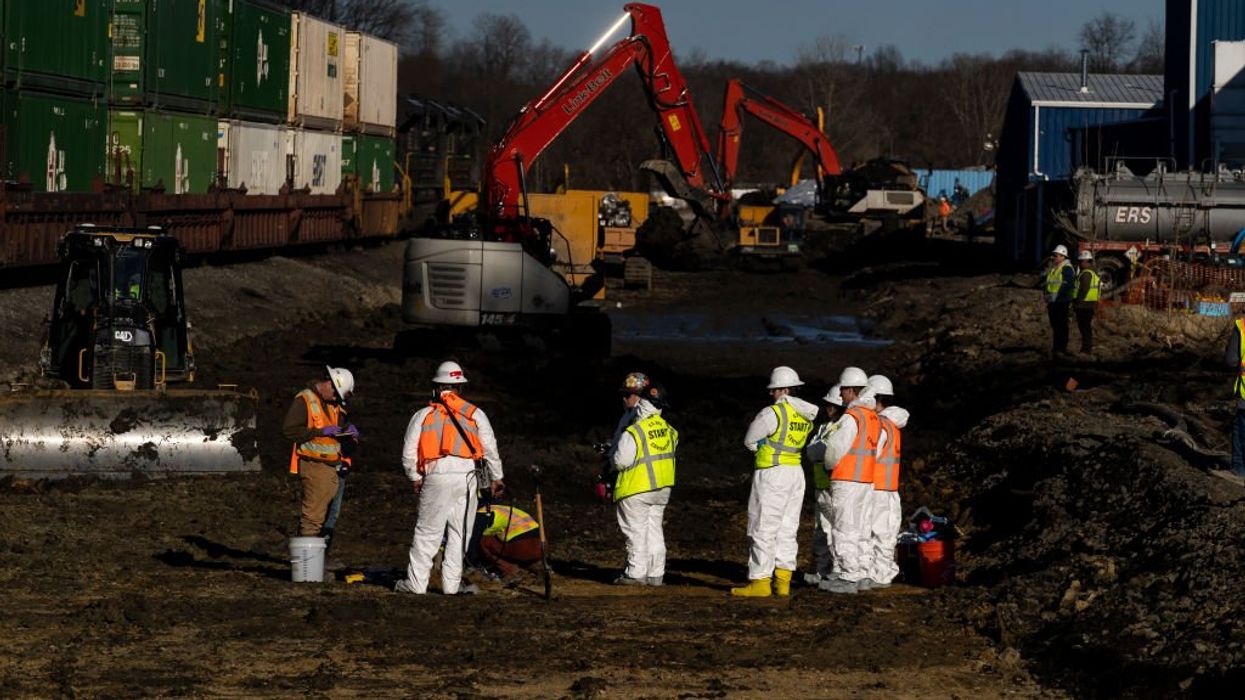
Michael Swensen/Getty Images

The U.S. Environmental Protection Agency said the soil in East Palestine does not contain dangerous levels of a cancer-causing chemical. However, a past scientific recommendation from the EPA contradicts that assertation.
Earlier this month, Environmental Protection Agency regional administrator Debra Shore said there were "very low levels" of dioxins during a hearing of the U.S. Senate Committee on Environment and Public Works.
"We detected very low levels, which very quickly went even down to non-detect. Without those primary indicators, it was a very low probability that dioxins would have been created,” Shore told Congress. "They are secondary byproducts of the burning of vinyl chloride, but we were listening to the community and they expressed significant concerns about toxins."
The EPA waited a month before ordering dioxin testing near the toxic Norfolk Southern train derailment in East Palestine, Ohio.
Pace Analytical, an independent lab based in Indiana, released a report on whether there were dangerous concentrations of chemicals in soil samples from East Palestine.
The Guardian reported, "Regulators establish the toxicity of dioxins in a soil sample by calculating the 'toxicity equivalence' of all dioxins in the soil compared with the most toxic dioxin compound, called 2,3,7,8 TCDD. East Palestine soil showed levels of '2,3,7,8 TCDD toxicity equivalence' of 700 parts per trillion (ppt)."
Since 1998, the EPA determined that dioxin soil concentrations of less than 1,000 parts per trillion (ppt) were safe for residential areas and between 5,000 ppt to 20,000 ppt in commercial and industrial soil. Anything above those levels would trigger a cleanup.
However in 2010, the EPA proposed drastic reductions in what concentration of dioxin the agency determined to be safe based on the "best available peer-reviewed science." The concentration of dioxins in the East Palestine soil samples is as much as hundreds of times greater than the threshold from the EPA's safety recommendation from 2010.
The EPA declared in 2010, "Based on a consideration of oral and dermal exposures to dioxin, EPA has developed the following draft recommended interim PRGs for dioxin in soil: 72 ppt for residential soil and 950 ppt for commercial/industrial soil."
The environmental agency stated, "EPA believes that these draft recommended interim PRGs would generally provide adequate protection against non-cancer effects, and generally should protect against cancer effects."
However, the EPA also considered lowering the threshold far more to protect Americans against cancer and other health issues.
"EPA is considering (and requesting comment on) an alternative concentration of 3.7 ppt TEQ in residential soil and 17 ppt TEQ in commercial/industrial soil as draft interim preliminary remediation goals," the agency said in its Draft Recommended Interim Preliminary Remediation Goals for Dioxin in Soil.
The EPA proclaimed that the 3.7 ppt concentration "would be protective for cancer and non-cancer effects."
Mathy Stanislaus, EPA assistant administrator for solid waste and emergency response, said in 2010: "We're driven by the need to protect against excessive risk of both cancer and non-cancer health concerns. We believe (the current standards) are not sufficiently protective and more stringent numbers are needed."
The Obama administration killed the proposed decrease in the dioxin threshold at the time, according to Global News.
Dioxin concentrations that require cleanups are much lower in several states, including 90 ppt in Michigan, and 50 ppt in California.
The EPA released a statement regarding the soil samples, "The available data, analyzed and validated by an independent laboratory, shows the waste from East Palestine that went to Indiana does not contain harmful levels of dioxins."
Linda Birnbaum, a leading dioxins researcher, toxicologist, and former director of the National Institute for Environmental Health Sciences, said the burning of vinyl chloride from the train derailment could have created dioxins.
Birnbaum added, "The levels are not screaming high, but we have confirmed that dioxins are in East Palestine's soil. The EPA must test the soil in the area more broadly."
Carsten Prasse, an organic chemist at Johns Hopkins University, told The Guardian, "I certainly wouldn't be comfortable living there."
The EPA website notes that dioxins are persistent organic pollutants that "take a long time to break down once they are in the environment."
The EPA warns: "Dioxins are highly toxic and can cause cancer, reproductive and developmental problems, damage to the immune system, and can interfere with hormones."
The World Health Organization states, "Long-term exposure is linked to impairment of the immune system, the developing nervous system, the endocrine system, and reproductive functions."
A paper published in Environmental Sciences Europe – a peer-reviewed scientific journal covering environmental science – warns of the dangers of endocrine-disrupting dioxins:
Dioxins are a group of highly persistent lipophilic chemicals produced as a by-product to several industrial and natural processes including smelting, chlorine bleaching of paper and pulp, in production of some pesticides, biomedical and plastic waste incineration. Chemically it is 2,3,7,8- tetrachlorodibenzo para dioxin (TCDD) and is considered a “dirty dozen” that is a cluster of hazardous chemicals also known as persistent organic pollutants (POPs) as they resist biological and environmental degradation. They are of concern because of their highly toxic nature and ability to get absorbed by fat tissue and stored in the body for long periods (7–11 years). They are known to cause serious reproductive, developmental, and cancer problems.
President Joe Biden has not visited East Palestine since the toxic train derailment happened on Feb. 3. More than two weeks ago, Biden promised that he would "be out there at some point."
Like Blaze News? Bypass the censors, sign up for our newsletters, and get stories like this direct to your inbox. Sign up here!